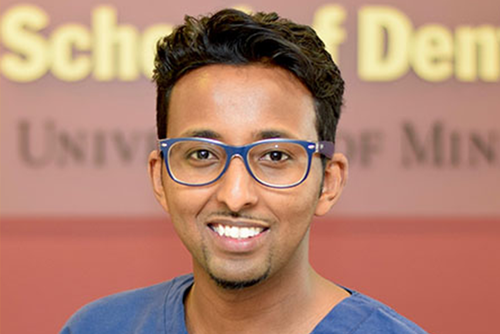
For young Elmi Ibrahim, the sprawling refugee camp in the Kenyan desert was his entire world for eight years. After his father was killed in the civil war in their home country of Somalia, his mother fled to Kenya with Ibrahim and his four siblings.
“As a child, it all seemed normal,” says the recent School of Dentistry graduate. “There was no school, and we could not leave the camp. It was all I knew. So my memory is of playing outside with a lot of other children every day. My mom sheltered us from the threats around us. ...”
At age 10, Ibrahim was plagued by an infected molar that kept him awake at night. With no professional oral health care available at the camp, Ibrahim suffered for a full year before the family was able to migrate to the United States.
His family resettled in Burnsville, Minn., and a volunteer took them immediately to the University of Minnesota Dental Clinics where Ibrahim remembers feeling the pain dissipate instantly, for the first time, with Novocain. “It was such a relief I cannot even describe it,” he says.
Ibrahim learned English quickly, excelled in school, earned a bachelor’s degree from the University of North Dakota, and worked in a lab at the University of Minnesota for four years before applying to dental school.
As a dental student and father, he has carved out time to improve the oral health of underserved communities; in particular, the more than 100,000 Somali Americans living in the Twin Cities.
Ibrahim worked with Professor Nelson Rhodus and fellow students to offer free oral cancer screenings at Mosques, apartment buildings, and a Somali mall. He says the community was initially skeptical, but once they realized his group was not selling anything and that he and other Somali students spoke their language, they began to trust the screenings.
Next for Ibrahim is a general practice residency at Hennepin County Medical Center, where he hopes to gain experience treating medically complex patients. He plans to one day open a practice with his sister, where they will see any patient who walks in the door.
It pained Ibrahim to learn last year that only recently have professional oral health care services been brought to the more than 160,000 residents of his former refugee camp in Kenya.
“I had hoped, all this time, that things had improved with health care there,” he says. “I have been gone for 20 years and am learning that only recently are dentists going to the camp. I would like to be one of them someday.”
- Categories:
- Health




